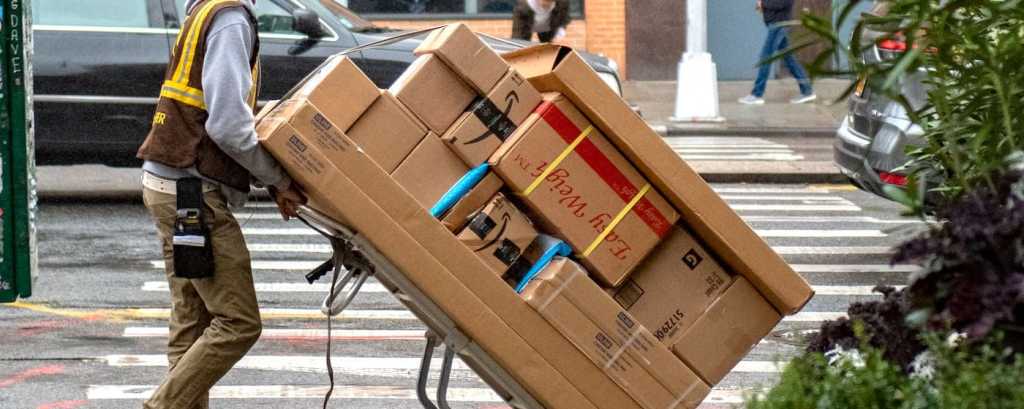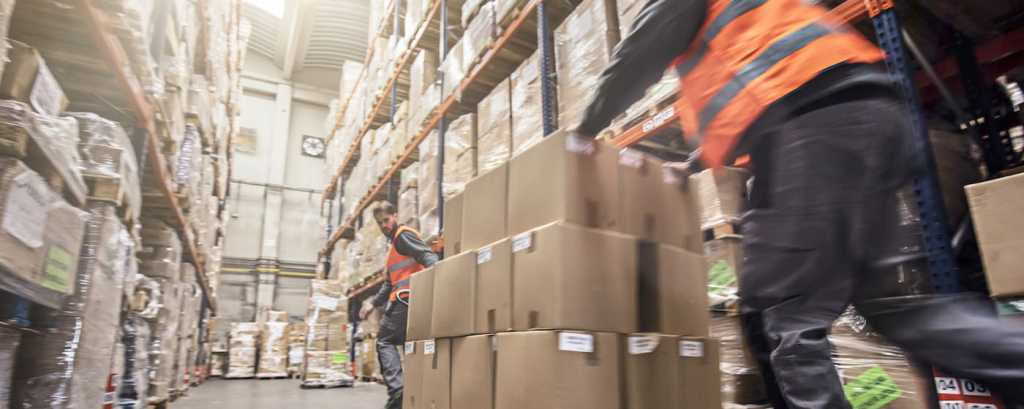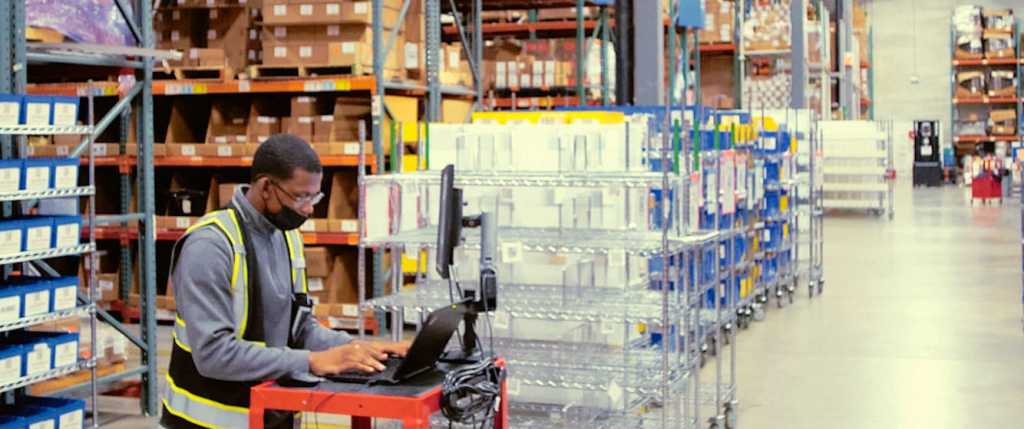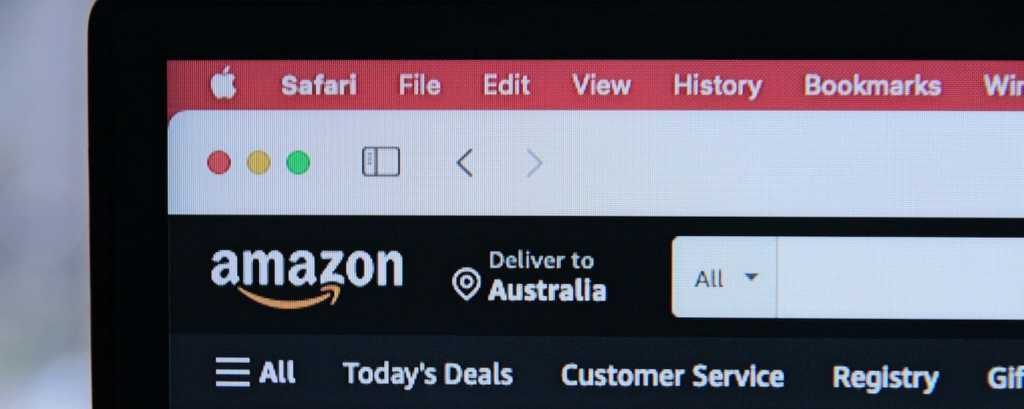Table of Contents
** Minutes
Key differences between a courier and a parcel carrier
Functions that courier services offer
When should you use a courier?
5 factors to consider when choosing a courier service
How ShipBob can help your business with fast and affordable shipping options
83% of companies believe it’s important to make customers happy. For ecommerce businesses, that means getting customers their orders quickly, efficiently, and in one piece.
This is where delivery partners like courier services play a crucial role. Couriers make the entire difference between an order getting delivered on time and an order being delayed. In other words, they could make or break your customer experience.
In this post, we take a closer look into what courier services are, what functions they offer, and when they make a great choice for your business. More importantly, we show you the different factors that will help you choose the perfect courier service to partner with. Let’s find out.
Table of contents
- What is a courier?
- Key differences between a courier and a parcel carrier
- Functions that courier services offer
- When should you use a courier?
- 5 factors to consider when choosing a courier service
- How ShipBob can help your business with fast and affordable shipping options
- What is a courier FAQs
What is a courier?
A courier is a person or company that provides a premium, all-inclusive delivery service that transports parcels or consignments from one place to another in the shortest time possible. While both individuals and companies alike can use this service, courier services are particularly useful for businesses that sell products online and need a fast, affordable, and trusted solution for sending packages. As such, many ecommerce businesses use couriers such as FedEx, UPS, OnTrac Inc, or TFI International that can provide reliable service.
Couriers differ from postal services, which are commonly used for transporting letters and parcels and can take longer periods of time to arrive at their destination.
What are the different types of couriers?
When choosing a courier service to work with, you may come across many different types of companies offering different types of services. Some may have varying scopes of work while others may have different delivery methods. Let’s find out the different types of couriers to understand the various options you have available.
Local courier services
These types of couriers operate locally and only offer their delivery services within the city. That means if you work with a local courier service, you can only send packages to others who live in the same city. For example, New York City couriers such as RDS Delivery Service and Manhattan Courier Service provide same-day delivery for time sensitive packages throughout the city. Many locally based enterprises partner with them to deliver goods to their customers.
Global courier services
These couriers operate on a much larger scale, often spanning multiple continents and countries. For example, you can send orders from the U.S. to someone in Europe with the help of courier services such as FedEx, UPS, and DHL.
Global courier services often have huge fleets and sophisticated infrastructure that allow them to deliver a better level of service than postal companies.
Standard delivery services
Couriers that offer standard delivery services maintain a set of guidelines based on where you live. This typically means having to pay extra charges if your package exceeds the given weight limit. They often take 2-3 days to deliver the items, making them a great and affordable option for sending packages if you’re not in a hurry.
Same-day couriers
As the name suggests, same-day couriers deliver your package on the same day that it’s sent out. This is the ideal option for those who are in a rush to get their orders delivered. FedEx and UPS offer these courier services.
However, there are certain requirements you must meet. Deliveries must be local or abide my a certain cutoff time to ensure that the packages can be delivered within the promised time.
For example, ShipBob offers same-day fulfillment for B2C orders imported into the ShipBob dashboard by the time of the outbound fulfillment SLA (ranging from noon to 6pm local time of the fulfillment center fulfilling it, depending on the location).
This way, the courier has sufficient time to arrange the route and pick up the package and the merchant has more time to accept orders that ship out the same day they are placed.
Overnight shipping
Most courier services have set operation hours typically ranging from 8 AM to 5 PM local time. After those operating hours, they no longer take on additional packages and at that point they focus on sending out the remaining packages.
However, overnight shipping services don’t have time-related restrictions and continue shipping out items even at night. That way, you don’t have to worry about the goods being stuck in traffic and being at risk of damage or expiration in transit. FedEx, UPS, and USPS offer overnight shipping options.
Rush and on-demand deliveries
Rush and on-demand deliveries are even faster than same-day delivery services, getting items delivered within half a day. It typically only takes four hours for rush and on-demand deliveries to be completed. This type of service is ideal if you have extremely urgent items and important documents to send. For example, RTD Logistics offers on-demand deliveries and even has a Next Flight Out (NFO) via TSA-Certified Couriers.
Key differences between a courier and a parcel carrier
A common mistake people make is confusing a courier with a parcel carrier, like USPS. Since both services deal in the transportation and delivery of goods, it’s an easy mistake to make. If you’re trying to decide which is the best option for you, here are the key differences between a courier and a parcel carrier:
- Parcel carrier services typically set limitations in terms of package weight and dimensions, whereas courier services are customizable for your needs and can even handle non-standard packages.
- Parcel carrier services are best for standard deliveries, while courier services are ideal for faster deliveries like next-day and same-day shipping.
- With courier services, the service is personalized for you, and they take extra care of your goods. Meanwhile, parcel carrier services are generalized and have a higher risk of parcel damage.
- Courier services tend to cost more whereas parcel carrier services are the cheapest way to ship items.
Functions that courier services offer
Courier services perform the following functions:
- Picking up items to be delivered
- Verifying the accuracy of delivery information including addresses and phone numbers
- Loading the packages onto the delivery vehicles
- Arranging the most efficient delivery route
- Delivering the items to their final destination based on the planned route
- Collecting necessary signatures and payments
- Maintaining a record of delivery information such as the recipient’s name and delivery time
What can a courier deliver?
Most couriers deliver a wide variety of items – ranging from small consumer goods to bulky furniture. They can also deliver mail, luggage, pallet shipments, important documents, and even medical supplies. Some couriers even specialize in one type of service (i.e., pharmaceutical and medical items that need special handling).
What courier services do different businesses use?
Businesses from various industries use courier services in different capacities. Couriers have adopted specialized services and offerings to meet the needs of different business. For example, the delivery needs of a medical company differs from that of a business professional.
Couriers like Medical Couriers specialize in healthcare related deliveries, such as the pickup and delivery of medicines, medical equipment and supplies, and medical specimens, such as blood tests and COVID-19 tests. These types of couriers have HIPAA compliant drivers and offer specific temperature-controlled features to maintain the integrity of samples. This way doctor’s offices, hospitals, and other establishments can safely transport shipments.
Alternatively, couriers like Hawk Couriers have dedicated legal protocols in order to quickly and discretely make deliveries for lawyers and law firms. These types of couriers often assign one courier to carry out the entire delivery process to ensure sensitive and/or confidential documentation gets into the right hands.
When should you use a courier?
Considering the quality of service they offer, there are many situations in which a courier makes the most sense. Consider using a courier if:
- Time is of the essence, and you want to deliver orders as quickly as possible.
- You don’t want to risk damaging items in transit.
- You need to ship items that require special handling during transport.
- Your packages tend to vary in size, and you often have to ship nonstandard packages.
When should you consider alternatives?
Some businesses may also prefer to use standard postal services or parcel carriers over courier services. This option makes the most sense if cost is your biggest concern and you don’t have to worry too much about speedy deliveries. If you’re sending items such as clothing that isn’t at risk of being damaged in transit, these alternatives are also worth considering.
You may also want to look for partners who can help you beyond the delivery stage. Some services such as 3PLs can offer more complete services and even help you arrange for returns shipping, for example.
5 factors to consider when choosing a courier service
Once you’ve decided that a courier service is the right choice for you, consider the following factors to narrow down the best option:
Availability
There are various considerations when looking for available couriers:
- Does the courier offer a service for the type of products you want to deliver? For example, if you’re sending soccer equipment to a tournament for a client, you may want to look into a courier like Red Rocket Couriers that has experience in the sports industry. If you need to quickly get food or beverage items from point A to point B, you’ll want to look for a courier that has refrigeration capabilities.
- Does the courier have the capacity to handle the number of packages you want to send each month? You’ll want to check with the courier to make sure your intended shipment volume is in line with what they’re able to deliver.
- Can the courier deliver to all the areas you service? For example, if you own a furniture shop and you want to send your handmade furniture to customers in the tri-state area, you’ll need a courier that can cover that geography. As mentioned above, some couriers only operate within the same state, or even the same city.
These are important questions to ask to check the service availability of a courier service to ensure your deliveries are made efficiently.
Limitations
It’s important to partner with a courier service that’s capable of meeting all your delivery needs. So, make sure to check ahead for any limitations – whether it’s in terms of delivery method, package size and weight, product type, and so on.
Cost to value
When choosing a courier service, consider their rates and compare the cost against what they offer. For example, if you’re shipping valuable jewelry and the courier charges more, the cost could be worth it if they can ship packages quickly and offer insurance.
Reliability
An important question to ask is: Does the courier have a solid reputation in general and within your industry? You need to make sure you’re partnering with a reliable courier service that can help you meet customer expectations. Otherwise, you could risk disappointing customers which may damage your reputation.
Use of technology
Tech enablement is crucial for couriers, just like it is for other postal carriers. Having adequate technology is important to shorten delivery times, give visibility into delivery tracking, and offer better access to customer support.
How ShipBob can help your business with fast and affordable shipping options
ShipBob is a world-leading 3PL that offers fast and affordable shipping options for ecommerce businesses. With fulfillment centers distributed across the contiguous US and different parts of the world, ShipBob allows you to distribute your inventory to get your goods closer to your customers for faster deliveries.
ShipBob has a close partnership with leading international, national, and regional carriers so you can enjoy bulk shipping discounts. Using our proprietary software, you can easily compare rates between multiple carriers and decide on the best option for each order.
ShipBob is also constantly finding ways to speed up transit times for customers, offering same-day fulfillment and delivering orders in as little as two days. That way, your customers can enjoy a seamless fulfillment experience while you keep your fulfillment costs low.
Ready to get started with ShipBob?
If ShipBob sounds like the fulfillment solution your business needs to succeed, request a quote to connect with our team.
What is a courier FAQs
Below are answers to the top questions about couriers.
What is the difference between a delivery service and a courier?
A courier is a person or company that delivers parcels or consignments from one place to another, whereas a delivery service is a broad term that encompasses all types of companies that deliver different types of goods.
Are FedEx, USPS, and UPS considered couriers?
FedEx and UPS can be considered couriers, whereas USPS is a postal service.
Is courier faster than regular mail?
Courier is typically faster than regular mail, sometimes even delivering packages on the same day.
Is a courier a postal service?
No. A postal service is a delivery company that’s typically operated by national governments.
How much does a courier cost?
Courier shipping costs vary based on a number of factors such as package weight and dimensions, delivery speed, shipping destination, and package contents. Standard delivery for small and lightweight packages may start from $25. You can expect surcharges for additional handling and services.
What is a speciality courier service?
Speciality courier services are focused on accommodating the different constraints and specifications required for your deliveries. Speciality couriers services can include temperature controls, GPS tracking, lock box pick-ups, gift deliveries, and more.



